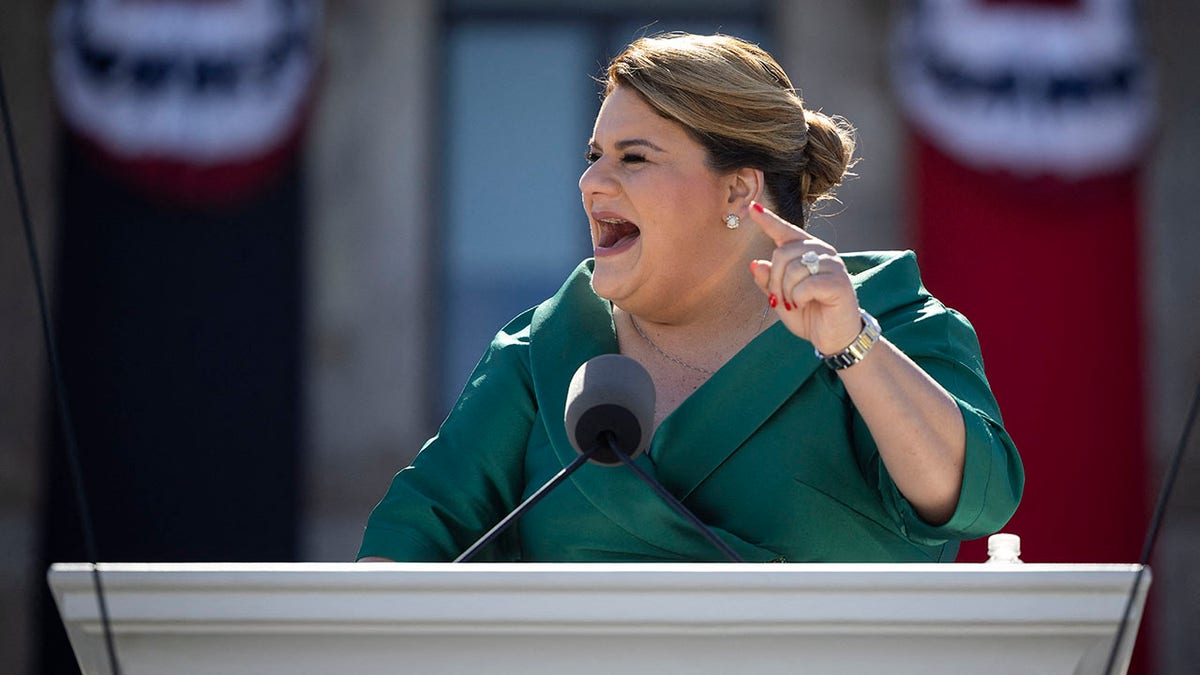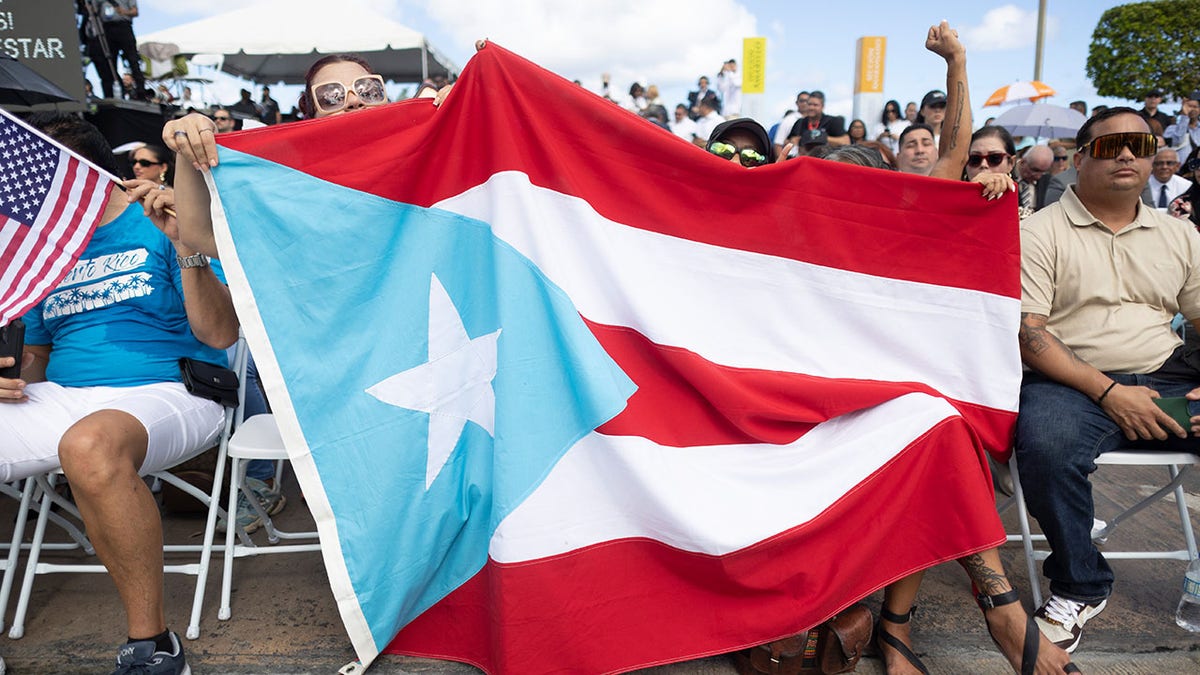The governor of Puerto Rico pleaded for President-elect Trump to intervene after Venezuelan dictator Nicolás Maduro threatened to invade the U.S. island territory.
In a letter addressed to Trump, Gov. Jenniffer González-Colón said, “[J]ust a few days after holding an illegitimate swearing-in ceremony in a desperate attempt to cling to power in Venezuela,” Maduro “publicly proposed an invasion of Puerto Rico.”
Maduro, who was sworn in for a third six-year presidential term despite international condemnation of his recent reelection as illegitimate, made the threat Saturday at the end of the “International Anti-Fascist Festival” hosted in Caracas. The socialist dictator made an apparent reference to Trump’s remarks eyeing U.S. control of the Panama Canal and Greenland, stating: “Just as the North has an agenda of colonization, we have an agenda of liberation.” Maduro vowed that the “freedom of Puerto Rico is pending, and we will achieve it with Brazilian troops,” according to Latin America Reports.
“This is an open threat to the United States, our national security, and stability in the region,” González-Colón told Trump. “I trust your incoming administration will swiftly respond and make clear to the Maduro regime that, under your leadership, the United States, will protect American lives and sovereignty and will not bow down to the threats of petty, murderous dictators.”
González-Colón, who took office just earlier this month, went on to say that Puerto Rico has been an “essential part of the United States” since 1898, and she reiterated how Puerto Ricans were granted American citizenship in 1917 and “have contributed to every aspect of American life, including the hundreds of thousands of service members from the Island who have fought alongside our fellow citizens in every U.S. military conflict since World War I.”
“Contrary to Maduro’s and other adversaries’ calls for independence, the people of Puerto Rico have repeatedly rejected this option. Instead, we have voted to strengthen our union with the United States through statehood – most recently in the November 5, 2024, plebiscite held alongside our general elections,” González-Colón wrote, referring to the latest nonbinding referendum regarding Puerto Rico’s political status.
The results showed 56.87% voted in favor of U.S. statehood, while 12.29% opted for “free association with the United States.” Meanwhile, 30.84% voted for independence.
The option of retaining the island’s current status as a U.S. territory, as well as U.S. citizenship, was not included on the referendum ballot.
González-Colón, a Republican and member of the pro-statehood New Progressive Party, also reiterated how Puerto Rico is home to Fort Buchanan – the only U.S. Army installation in the Caribbean – and National Guard facilities like Camp Santiago, Fort Allen, and Muniz Air National Guard Base, “all of which strategically support exercises and operations conducted by the U.S. military and our partners.” The letter went on to say how Puerto Rico also hosts “critical U.S. Coast Guard and U.S. Customs and Border Protection assets and units that help secure our borders and combat the drug trafficking networks that fund the Maduro narco-regime.”
She noted that the United States shares a maritime boundary with Venezuela in Puerto Rico.
“Maduro’s calls for an invasion are a clear attempt to get rid of the United States’ presence and grow his influence in the area,” González-Colón wrote, telling Trump that she’s “ready to work with you and your administration to counter this and other threats posed by the illegitimate Maduro dictatorship and support the people of Venezuela in their quest for freedom.”
González-Colón also said she looks forward to meaningful discussions to “best enhance Puerto Rico’s national security role and take a strong stance against the growing presence of our adversaries in the region.”
Rep. Mario Rafael Díaz-Balart, R-Fla., commended González-Colón’s “leadership in condemning the absurd and pathetic threats to Puerto Rico from Venezuela’s dictator – a dictator who is desperately clinging to illegitimate power.”
“What a contrast to the courage and inspiration demonstrated by the Venezuelan people and heroine María Corina Machado,” Díaz-Balart wrote. “With Biden in the White House, adversaries such as those within the Maduro narco-dictatorship have been emboldened by his weak policy of appeasement. But in less than a week, a new foreign policy will begin where freedom and U.S. national security interests are paramount. Friends will be treated as friends, and adversaries as adversaries.”
“Maduro’s days are numbered,” the congressman added. “If the dictator in Venezuela does not want to end up like other dictators Mussolini and Gaddafi, he should leave Venezuela without delay.”
When Maduro was sworn in last week, Biden defended his decision not to toughen sanctions on Venezuela’s energy sector, saying he was worried it could have created an opening to be filled by Iranian oil.
Despite sanctioning a number of Maduro officials, the administration did not end a license it granted oil giant Chevron to export Venezuelan oil to the U.S. That license has significantly boosted oil production, and state coffers, as a result.
The Associated Press contributed to this report.
The governor of Puerto Rico pleaded for President-elect Trump to intervene after Venezuelan dictator Nicolás Maduro threatened to invade the U.S. island territory.
In a letter addressed to Trump, Gov. Jenniffer González-Colón said, “[J]ust a few days after holding an illegitimate swearing-in ceremony in a desperate attempt to cling to power in Venezuela,” Maduro “publicly proposed an invasion of Puerto Rico.”
Maduro, who was sworn in for a third six-year presidential term despite international condemnation of his recent reelection as illegitimate, made the threat Saturday at the end of the “International Anti-Fascist Festival” hosted in Caracas. The socialist dictator made an apparent reference to Trump’s remarks eyeing U.S. control of the Panama Canal and Greenland, stating: “Just as the North has an agenda of colonization, we have an agenda of liberation.” Maduro vowed that the “freedom of Puerto Rico is pending, and we will achieve it with Brazilian troops,” according to Latin America Reports.
“This is an open threat to the United States, our national security, and stability in the region,” González-Colón told Trump. “I trust your incoming administration will swiftly respond and make clear to the Maduro regime that, under your leadership, the United States, will protect American lives and sovereignty and will not bow down to the threats of petty, murderous dictators.”

González-Colón, who took office just earlier this month, went on to say that Puerto Rico has been an “essential part of the United States” since 1898, and she reiterated how Puerto Ricans were granted American citizenship in 1917 and “have contributed to every aspect of American life, including the hundreds of thousands of service members from the Island who have fought alongside our fellow citizens in every U.S. military conflict since World War I.”
“Contrary to Maduro’s and other adversaries’ calls for independence, the people of Puerto Rico have repeatedly rejected this option. Instead, we have voted to strengthen our union with the United States through statehood – most recently in the November 5, 2024, plebiscite held alongside our general elections,” González-Colón wrote, referring to the latest nonbinding referendum regarding Puerto Rico’s political status.
The results showed 56.87% voted in favor of U.S. statehood, while 12.29% opted for “free association with the United States.” Meanwhile, 30.84% voted for independence.
The option of retaining the island’s current status as a U.S. territory, as well as U.S. citizenship, was not included on the referendum ballot.
González-Colón, a Republican and member of the pro-statehood New Progressive Party, also reiterated how Puerto Rico is home to Fort Buchanan – the only U.S. Army installation in the Caribbean – and National Guard facilities like Camp Santiago, Fort Allen, and Muniz Air National Guard Base, “all of which strategically support exercises and operations conducted by the U.S. military and our partners.” The letter went on to say how Puerto Rico also hosts “critical U.S. Coast Guard and U.S. Customs and Border Protection assets and units that help secure our borders and combat the drug trafficking networks that fund the Maduro narco-regime.”

She noted that the United States shares a maritime boundary with Venezuela in Puerto Rico.
“Maduro’s calls for an invasion are a clear attempt to get rid of the United States’ presence and grow his influence in the area,” González-Colón wrote, telling Trump that she’s “ready to work with you and your administration to counter this and other threats posed by the illegitimate Maduro dictatorship and support the people of Venezuela in their quest for freedom.”
González-Colón also said she looks forward to meaningful discussions to “best enhance Puerto Rico’s national security role and take a strong stance against the growing presence of our adversaries in the region.”
Rep. Mario Rafael Díaz-Balart, R-Fla., commended González-Colón’s “leadership in condemning the absurd and pathetic threats to Puerto Rico from Venezuela’s dictator – a dictator who is desperately clinging to illegitimate power.”

“What a contrast to the courage and inspiration demonstrated by the Venezuelan people and heroine María Corina Machado,” Díaz-Balart wrote. “With Biden in the White House, adversaries such as those within the Maduro narco-dictatorship have been emboldened by his weak policy of appeasement. But in less than a week, a new foreign policy will begin where freedom and U.S. national security interests are paramount. Friends will be treated as friends, and adversaries as adversaries.”
“Maduro’s days are numbered,” the congressman added. “If the dictator in Venezuela does not want to end up like other dictators Mussolini and Gaddafi, he should leave Venezuela without delay.”
When Maduro was sworn in last week, Biden defended his decision not to toughen sanctions on Venezuela’s energy sector, saying he was worried it could have created an opening to be filled by Iranian oil.
CLICK HERE TO GET THE FOX NEWS AP
Despite sanctioning a number of Maduro officials, the administration did not end a license it granted oil giant Chevron to export Venezuelan oil to the U.S. That license has significantly boosted oil production, and state coffers, as a result.
The Associated Press contributed to this report.



